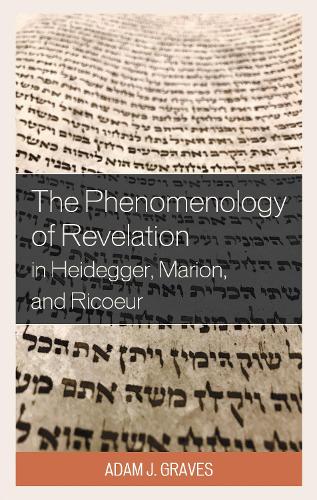
The Phenomenology of Revelation in Heidegger, Marion, and Ricoeur
(Paperback)
Available Formats
Publishing Details
The Phenomenology of Revelation in Heidegger, Marion, and Ricoeur
By (Author) Adam J. Graves
Bloomsbury Publishing PLC
Lexington Books
29th January 2025
United States
Classifications
Professional and Scholarly
Non Fiction
Linguistics
Theology
142.7
Physical Properties
Paperback
266
Width 152mm, Height 229mm
Description
The Phenomenology of Revelation in Heidegger, Marion, and Ricoeur provides a critical framework for understanding the phenomenology of revelation through a series of close readings that serve as the basis for an imagined dialogue between Martin Heidegger, Jean-Luc Marion, and Paul Ricoeur. Adam J. Graves distinguishes between two dominant approaches to revelation: a radical approach that seeks to disclose a pre-linguistic experience of revelation through a radicalization of the phenomenological reduction, and a hermeneutical one that characterizes revelation as an eruption of meaning arising from our encounter with concrete symbols, narratives, and texts. According to Graves, the radical approach is often driven by a misplaced concern for maintaining philosophical rigor and for avoiding theological biases, or contaminations. This preoccupation leads to a process of counter-contamination in which the concept of revelation is ultimately estranged from the phenomenons rich historical and linguistic content. While Ricoeurs hermeneutic phenomenology may do a better job of accommodating the concrete content of revelation, it does so at the price of having to renouncing the kind of presuppositionlessness generally associated with phenomenological method. Ultimately, Graves argues that a more nuanced appreciation of the complex nature of our linguistic inheritance enables us to reconceive the relationship between revelation and philosophical thought.
Reviews
A groundbreaking work. In this highly compelling and provocative book, Adam Graves accomplishes what no serious thinker has done since Hegel; he demonstrates decisively how the problem of 'revelation' is not just a theological sideshow but an integral problem for philosophy itself in the 21st century. -- Carl Raschke, University of Denver
Adam Graves's new book The Phenomenology of Revelation in Heidegger, Marion and Ricoeur is a leading-edge study of the problem of revelation amid the many twisting theological turns in recent French philosophy. Revelationthe event of transcendence itself and the literary means by which this event is expressedis the impossible possibility with which Gravess three philosophers struggle. In this struggle, Graves offers Ricoeurs text-based hermeneutics of revelation as a compelling counterpoint to Heideggers and Marions pre-linguistic notions of revelation as pure givenness. As Ricoeur writes, it is only 'by interpreting that we can hear again.' For Ricoeur, then, there is no pure revelation: what is primordially given can only arise within the rich intertexual milieu of a cultures founding religious classics.
Eminently readable, bracingly philosophical, and carefully researched, Gravess book bristles with original insights into the perennial question, how can a Word beyond words be understood within the mere words of human language This book is a must-read for anyone interested in the problem of revelationhow to say the unsayablewithin contemporary philosophy and theology.
Adam Graves book on the phenomenology of revelation is itself a stunning revelation. For the uninitiated, Graves provides an accessible orientation into the historical context and key issues at stake in debate over the 'theological turn' of French phenomenology. But this book offers even more value to those who are already familiar with these debates. Graves offers a new path forward by making the case for a hermeneutical approach to revelation that recognizes the full revelatory power of the Word. -- Scott Davidson, West Virginia University
Adam J. Gravess rigorous comparison of revelation in Martin Heidegger, Jean-Luc Marion, and Paul Ricoeur cogently shows that phenomenologys 'turn to theology' neither requires a return to primordial ontology nor calls for a retreat into the paradoxes of a prelinguistic givenness, but more simply and radically urges us to begin a long journey in the frequentation of mutually enriching symbols and narratives; only then can we grasp concretely how the Word can make the World. -- Jean-Michel Rabat, University of Pennsylvania
Adam Graves provides a timely revision of phenomenology by revelation and revelation by phenomenology. Contesting the old antagonism between philosophy and theology, he sketches a dialogical hermeneutics of religion in deep conversation with three of the giants of continental philosophyHeidegger, Marion, and Ricoeur. A bold, challenging, and highly readable book. -- Richard Kearney, Boston College
Graves book on the phenomenology of revelation is invaluable for those interested in a deeper study of the complex interrelation between philosophy and theology as found in Heidegger, Marion, and Ricoeur. Graves succeeds in situating the development of the theological turn in a wider historical context, while raising an important concern about the project of phenomenology itself. * International Journal for Philosophy of Religion *
Author Bio
Adam J. Graves is professor of philosophy at Metropolitan State University of Denver.
